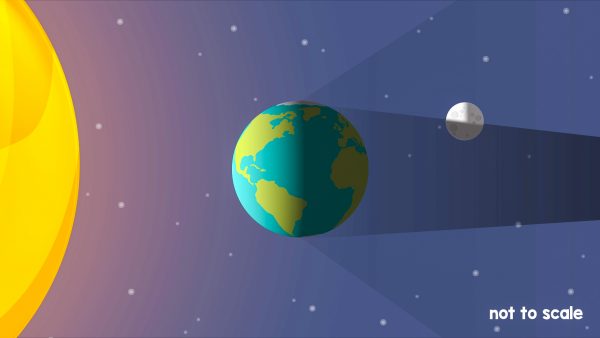Astronomy Definition
Astronomy studies celestial objects, space, and the universe. For example, astronomers use telescopes to discover new planets.
View Lesson on Solar & Lunar Eclipses
Become a member to get full access to our entire library of learning videos, reading material, quiz games, simple DIY activities & more.
Become a member to get full access to our entire library of learning videos, quiz games, & more.
Plans & Pricingto watch this full video.

Access All Videos
and Lessons, No Limits.
Access All Videos

No credit card required,
takes 7 sec to signup.
No card required

Ready-to-go lessons
that save you time.
Ready-to-go lessons
If you are on a school computer or network, ask your tech person to whitelist these URLs:
*.wistia.com, fast.wistia.com, fast.wistia.net, embedwistia-a.akamaihd.net
Sometimes a simple refresh solves this issue. If you need further help, contact us.
Solar & Lunar Eclipses
Fun Facts
- Historically, astronomy focused on observations of heavenly bodies as ancient civilizations studied the night sky.
- Planetary astronomers focus on growth, evolution, and death of planets.
- Solar astronomers spend their time analyzing a single star or sun.
Why Do We Need To Know About Astronomy
Studying astronomy helps us learn about the universe and the importance of exploring it to find new planets. Astronomers, who are scientists focusing on space, use what they know about when the moon or sun is blocked (eclipses) to find planets beyond our solar system. This shows how astronomy can help us learn more about space.
This area of science has found more than 2000 planets, some of which are similar to Earth and might be able to support life. The Kepler Space Telescope is one tool that has helped a lot in finding these planets, showing that studying space is key to understanding our universe and where we fit in.
Frequently Asked Questions
Check out the Full Lesson on Solar & Lunar Eclipses
In this lesson, we learn that:
- A model of the solar system can explain eclipses of the sun and the moon.
- A solar eclipse happens when our view of the sun is blocked by the moon.
- A lunar eclipse happens when the moon passes into Earth's shadow.
Related Topics
- Astronomy Definition
- Biochemistry Definition
- Bioindicator Definition
- Circuit Definition
- Compound Definition
- Conductor Definition
- Conservation Biologist Definition
- Corona Definition
- DNA Definition
- Digital Signal Definition
- Dissolve Definition
- Earthquake Definition
- Electricity Definition
- Element Definition
- Energy Conversion Definition
- Fossil Record Definition
- Greenhouse Effect Definition
- Groundwater Definition
- Kinetic Energy Definition
- Landslide Definition
- Larvae Definition
- Lunar Eclipse Definition
- Material Definition
- Multicellular Definition
- Newton’s 1st Law Of Motion Definition
- Offspring Definition
- Opposable Thumb Definition
- Organelle Definition
- Partial Eclipse Definition
- Pendulum Definition
- Physical Change Definition
- Plant Growth Definition
- Predation Definition
- Problem Definition
- Rain Definition
- Renewable Resource Definition
- Salt Water Definition
- Scientific Name Definition
- Sediment Filter Definition
- Sedimentary Rock Definition
- Soil Definition
- Solar Eclipse Definition
- Star Definition
- Tides Definition
- Total Eclipse Definition
- Weather Definition
- Weather Map Definition
- Weathering Definition
Start a Free Trial Today. Get a $5 Amazon Gift Card!
Teachers! Start a free trial & we'll send your gift card within 1 day. Only cards left. Try it now.
Select Grade
Select Subject
This email is associated with a Science Kit subscription. Kit subscriptions are managed on this separate page: Manage Subscription

-
Download InvoiceScience & Math$/yr
-
Download InvoiceScience Only$/yr

access all lessons
• No credit card required •
"My students loved the videos. I started the video subscription in May and used them as a review before the state test, which I know contributed to 100% of my class passing the state test."
Rhonda Fox 4th Grade Teacher, Ocala, Florida
• No credit card required •
"My students loved the videos. I started the video subscription in May and used them as a review before the state test, which I know contributed to 100% of my class passing the state test."
Rhonda Fox 4th Grade Teacher, Ocala, Florida
• No credit card required •
Already a member? Sign In
* no credit card required *

* no credit card required *
* no credit card required *


no credit card required
Skip, I will use a 3 day free trial
Enjoy your free 30 days trial
-
Unlimited access to our full library
of videos & lessons for grades K-5. -
You won’t be billed unless you keep your
account open past your 14-day free trial. -
You can cancel anytime in 1 click on the
manage account page or by emailing us.
-
Unlimited access to our full library of videos & lessons for grades K-5.
-
You won't be billed unless you keep your account open past 14 days.
-
You can cancel anytime in 1-click on the manage account page.
Cancel anytime in 1-click on the manage account page before the trial ends and you won't be charged.
Otherwise you will pay just $10 CAD/month for the service as long as your account is open.
Cancel anytime on the manage account page in 1-click and you won't be charged.
Otherwise you will pay $10 CAD/month for the service as long as your account is open.
We just sent you a confirmation email. Enjoy!
DoneWe use cookies to make your experience with this site better. By using this site you agree to our use of cookies. Click "Decline" to delete and block any non-essential cookies for this site on this specific property, device, and browser. Please read our privacy policy for more information on the cookies we use.Learn More
We use cookies to improve your experience. By using this site, you agree to our use of cookies. Click "Decline" to block non-essential cookies. See our privacy policy for details.Learn More




























































































































